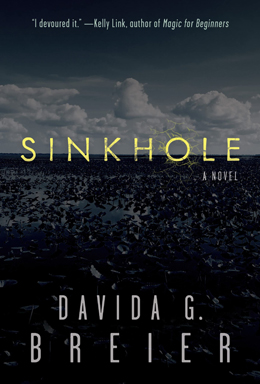Novels from University Presses have an uphill battle in the general marketplace, largely due to the lack of marketing money thrown in their direction, however quality does tend to rise to the surface as fans recently saw when Erin Flanagan’s Deer Season – a publication from the University of Nebraska Press – took home the Best First Novel Edgar Award last week. Readers looking to discover the next worthy novel from a University Press need look no further than Davida G. Breier’s Sinkhole, published by the University of New Orleans Press later this month.
Sinkhole is a southern gothic bildungsroman told in two timelines, each of which recount the coming-of-age of lead character, Michelle Miller. In the past – set in Lorida, Florida during the 1980s – readers follow as Michelle struggles to fit in at school until she finds a kindred spirit in fellow outcast, Sissy. In the present sections, Michelle hears news that her mother is in the hospital and must travel back to Lorida – site of so much past trauma – learning, in the end, the true meaning of maturity, friendship, and familial bonds.
Similar to works by Megan Abbott and John Copenhaver, Sinkhole documents the many challenges of female friendship during the ever-turbulent adolescent years. Things between Michelle and Sissy seem copasetic until Michelle befriends Morrison, a handsome and moody boy with a magnetic personality. Michelle immediately senses a shift in Sissy’s attitude and struggles to understand why. As the two compete for Morrison’s attention, the power of youthful insecurities override logic leading to unending drama and the eventual tragic outcome that will have Michelle fleeing Lorida forever.
In the modern-day set chapters, readers follow along on Michelle’s road-trip home to visit her ailing mother and the brother she hasn’t spoken to in years. As the passing landscape lulls Michelle, she remembers her childhood and the events that led to her self-imposed ostracism. In many ways it is a healing journey and by the time Michelle once again arrives in Lorida, readers will understand her troubles, empathize with her emotions, and share her shock when the truth is revealed. Structurally, the final third of the novel dispenses with the flashbacks and forces Michelle to confront her past in ways she is ill-equipped to handle.
Davida G. Breier writes with seductive language that drips with the humidity of summer nights, virtually hypnotizing the reader, transporting them back to the glory (or is it gory) of the 1980s. Nostalgia for that bygone era permeates every paragraph without sugar-coating the realities of rural existence before the advent of social media and the seeming interconnectedness of all.
There are large lessons underpinning Sinkhole. Breier skillfully avoids becoming pedantic or pedagogical with her themes and message, which only serves to further ensure their long-standing impact on the reader. Passages like “Try and remember something—fitting in and belonging are two different things” can be ruminated on for hours without fully absorbing the truth and power they contain. Sinkhole is not just a book you read, it is a book you experience deep in your soul; it alters you in ways that will only become apparent with time and reflection.
Sinkhole deserves to be on year-end best of lists across the board and this debut novel will amass Davida G. Breier a cult fan-following who will anxiously wait to see what she has to offer next.

BUY LINKS: Sinkhole by Davida G. Breier
Disclaimer: A print galley of this title was provided to BOLO Books by the publisher. No promotion was promised and the above is an unbiased review of the novel.
